| This article will guide you on how to install ELM327 USB Cable / Bluetooth scanner on your MAC computer. It will then work with OBD2 software (like TOAD) and your vehicle.
(If this step is missed, then OBD software is not going to work. So it's CRUCIAL that you follow below steps).
|
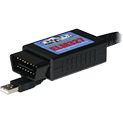 Download the following ELM327 drivers: Driver Pack 1, Driver Pack 2 Download the following ELM327 drivers: Driver Pack 1, Driver Pack 2
Install.
That's it.
OBD-2 software will now detect your ELM327 cable — and connect to car also. (If cable is still not found, then install Driver Pack 3.)
Plug your OBD 2 Bluetooth hardware interface into OBD 2 port ensuring a solid connection. OBD 2 connector locations vary by vehicle make. Please refer to service manual to locate your vehicle's OBD 2 port.
Turn the car ignition on. If this is the first attempt the BLUETOOTH DEVICE MUST BE PAIRED.
(NOTE: You only have 60 seconds to pair the Bluetooth scanner from the time you connect it to the car — to the time of entering the Pairing code. If more then 60 second pass — then Pairing code will be rejected and you'll have to plug out the scanner and try again. So have your Bluetooth devices window open, so you can immediately connect as soon as you see ELM327/OBDII/Unknown Device show up.)
In the upper right of the Apple menu bar click the Bluetooth symbol. Scroll down to set up Bluetooth device (You may need to turn Bluetooth "On" first).
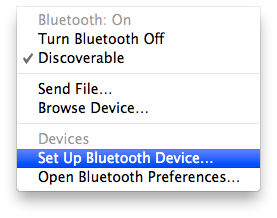
- In case the Bluetooth icon is not present in the menu bar, to go System Preferences » Bluetooth » and check the "Show Bluetooth status in the menu bar" box.
The Bluetooth setup assistant will search for devices automatically. The Bluetooth name for the ELM327 interfaces will be either "OBDII" or "CBT". Or even different.
If your device does not appear, ensure the ignition is "on" and your Bluetooth OBD 2 interface is securely connected. Verify that the OBD 2 interface is powered which is indicated by a steady red LED on the device.
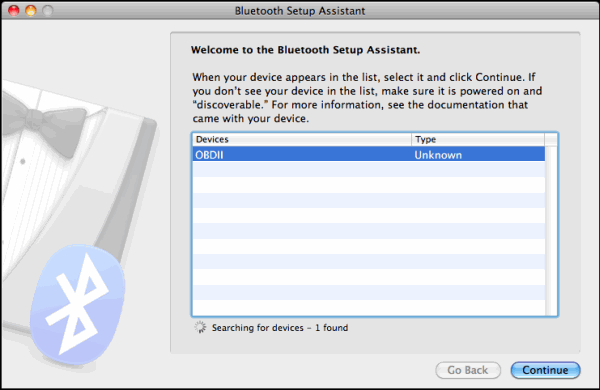
After initially attempting to pair, the Bluetooth Setup Assistant should display the message, "The pairing attempt was unsuccessful". This indicates the pairing passcode needs to be set.
Click "Passcode Options..." in the lower left.
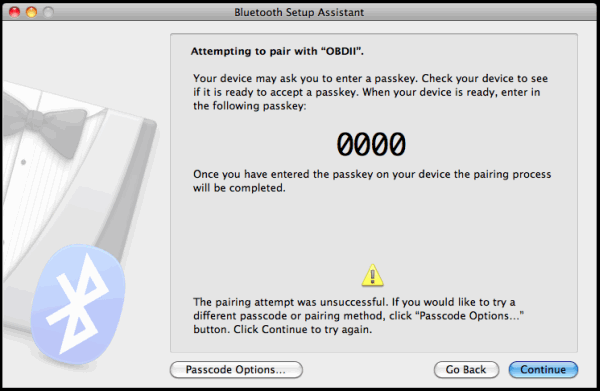
Select "Use a specific passcode" and enter "6789". If that doesn't work, then enter "1234". If that doesn't work, then enter "0000".
Click OK.
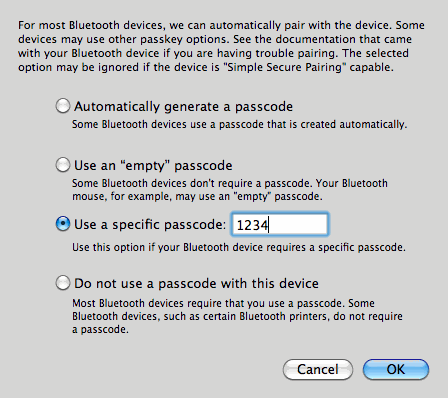
If the interface paired properly, a Bluetooth Setup Assistant window will appear confirming, "Pairing was completed successfully" and "A computer serial port was created".
Click Quit.
(Note: If the message "A computer serial port was created" does not appear, the interface IS NOT paired properly and OBD-2 software will not connect to your vehicle.)
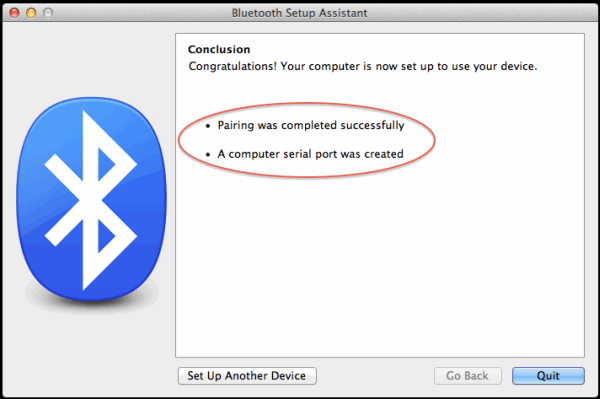
Launch the OBD software. And click connect.
If it doesn't connect, then you'll need to configure software preferences and specify which port number your ELM Bluetooth is on.
| Connection Preferences In OBD Software |
This section addresses common connection preferences you'll find in typical OBD software. So this is a short guide in case you're stuck on what settings to adjust.
If the software has "Auto" option to detect your ELM327 automatically — then choose it because it'll cycle through all ports on your computer until it finds the port with ELM327 connection on it.
However if it doesn't find your ELM327 interface, then you'll need to set the Serial/COM port manually to the same number where ELM327 is connected.
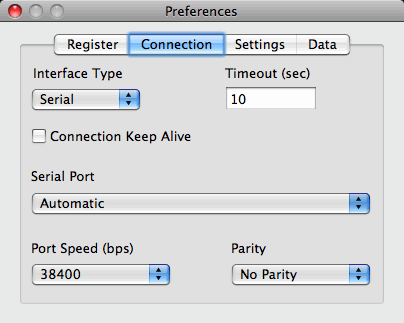
Typical example of OBD connection preferences.
The interfaces we currently ship require the 38400 (bps) setting.
Parity is a method for error detection in transmission. For most interfaces Parity should be set to "No Parity".
The timeout is how long the software will wait before it gives up on hearing back from a serial port.
Some cars respond more quickly, in which case the timeout should be set for a shorter duration so time is not wasted when troubleshooting connection issues.
However, some cars respond more slowly, in which timeout should be set for a longer duration to ensure that OBD software does not prematurely terminate communication.
| 


 Download the following ELM327 drivers:
Download the following ELM327 drivers: 









